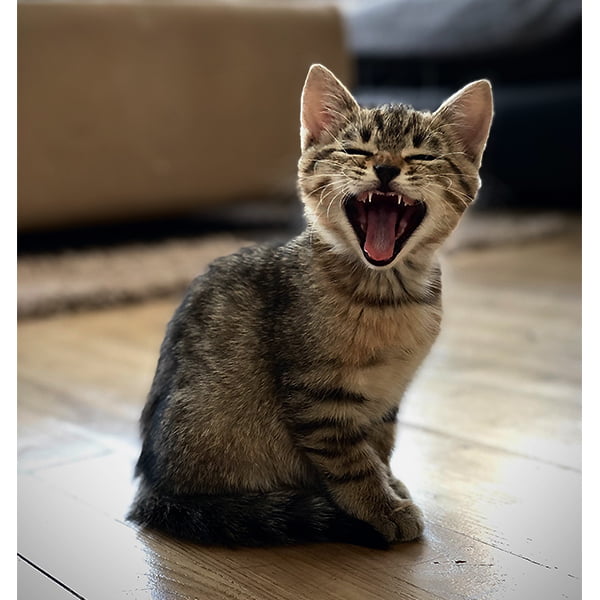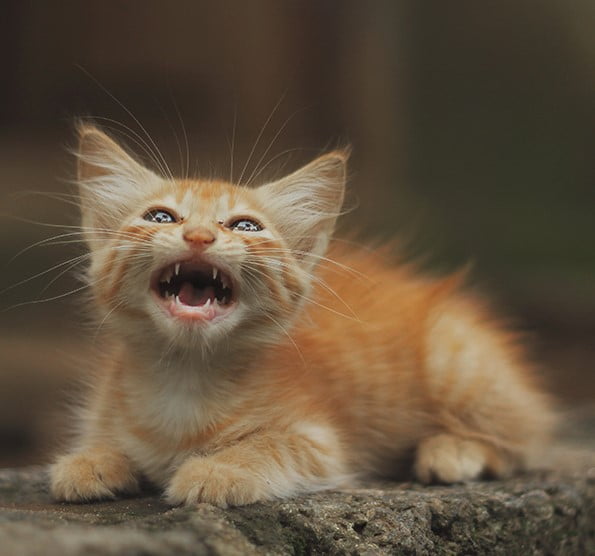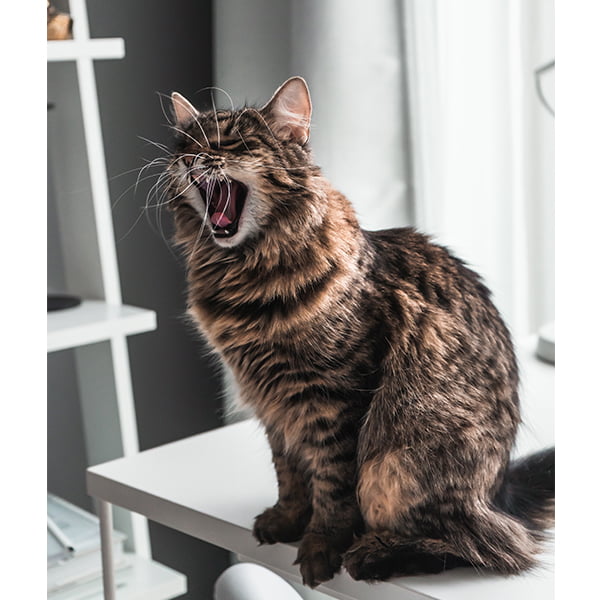It may be alarming for pet owners to realize that even the most docile and sweet of their kitties is capable of a menacing growl. Is it normal for cats to growl? Does it mean they are sick? What should you do if your cat begins growling more than usual? Why do cats growl at all?
What a Cat Growl Means
Cats do not have the facial expressiveness of dogs, so it can be harder to detect what their body language and sounds are communicating. A cat growl is a deep rumbling guttural sound, and noise is produced as the cat slowly exhales, similar to a dog growl. A cat's growling is a natural cat behavior in cats and is just one of the many vocalizations your cat uses to communicate how it feels or what it needs.
Cats growl when they are scared, annoyed, or angry, and growling is often accompanied by hissing and spitting as well. Your cat is generally stiff with flattened ears and a flicking tail, all signs that your cat is displeased about something.
6 Reasons A Cat Growls
If a cat growls as a way to communicate fear, frustration, or fury, what are the most common reasons and situations that illicit this deep grumbly warning?
Warning
Cats' growling often communicates that your cat needs you to back off. Maybe playtime is over, or they no longer want to cuddle. A growl can be a way to let you know to leave them alone for a bit. This is often more of an annoyed growl than anything else, and you should take the hint and give your cat space, so it doesn't become angry or stressed.

Source: Unsplash
Pain
If a cat is suffering from physical pain, it may growl if you try to touch or hold them. Other symptoms of sickness or harm often accompany this type of growling. If your cat exhibits other symptoms of sickness or has a noticeable change in regular behavior, it may be that your cat is unwell. In this case, you need to get your kitty to the vet so you can figure out what is wrong. Common issues include urinary tract infections, arthritis, dental disease, and hyperthyroidism, any of which could result in a more growly cat.
Possessive or Territorial
Some cats do not get along as well with other cats, pets, or even people. If a cat is possessive of its food, toys, or favorite napping spot, it may growl if someone tries to take it from them. Mother cats will also be territorial over their kittens and may growl if you try to get too close or try to take their babies away.
Stress
While pet parents may think their cats are cool and chill about everything that goes in their worlds, the truth is that cats can get stressed just like people and often by things you wouldn't think of. A stressed cat is much more likely to growl and lash out. Among the many things that could potentially stress a cat out are loud noises, bright lights, other household pets, children, and strangers.

Source: Unsplash
Fear
Cats often growl out of fear when they are caught off guard or surprised. They will usually also arch their back, have bristled fur, and flatten their ears. Cats are more and more prone to being scared the older they get, as their hearing begins to degenerate. Cat owners can prevent fear growling by being mindful of their cat and not intentionally sneaking up on it.
Aggression
Lastly, if a cat's warnings aren't being heeded, normal annoyed-growling can turn to flat-out angry growing. Hair on end, a flicking tail, and constricted or overly dilated eyes are all signs that your cat needs to be left alone or else someone might get hurt. Do not attempt to touch or stare down an angry, aggressive cat. Give it some personal space and time to cool down.

Source: Unsplash
What To Do With a Growling Cat
What should you do about a growling and hissing cat? Is it something to train out of them or something to learn from?
In general, a cat will growl to send a warning message. It is natural and normal and should also be respected. As a cat owner, try to find out why your cat may be upset and address it accordingly. You should never punish your cat for growling as it may not understand what it is being punished for, and it will likely only make your cat more upset and less trusting. Also, some timid or new cats are more prone to growling just because they are more nervous. Have some compassion towards these cats, especially rescues, as you never know what their history is.
Learn to read your cat's normal body language so that you can begin to tell the difference between a playful cat and an annoyed one. Knowing how your cat looks and acts when it is healthy is also helpful when ruling out illness or disease.
Stressed, annoyed, overstimulated domestic cats will resort to scratching, biting, hissing, and attacking, so you respect their needs. In the long run, it strengthens your bond if you learn to watch your cat's behavior and heed warning signs.
When to be Concerned About a Cat Growling
If a cat seems to have a habitual growing issue, there may be some cause for concern. Take your cat to the vet so your cat can be examined for illness or other causes for why your cat is growling more than usual. Other signs your cat might be unwell include a change in appetite, vomiting, or lethargy.
